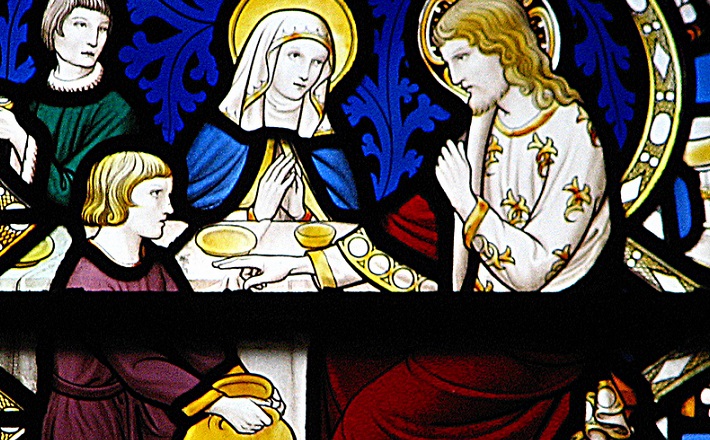Commentary on John 2:1-11
The first disciples have been gathered in the previous narrative and Jesus has announced that they will see “heaven opened and the angels of God ascending and descending on the Son of Man” (1:51). With this promise Jesus’ ministry begins. We will not literally see angels throughout his ministry, except at the end in the story of the empty tomb (20:11-13). But we will see them metaphorically as we witness Jesus’ unfolding self-revelation as the bridge between heaven and earth.
The story of the wedding is part of a wider narrative cycle that takes us from Cana of Galilee in a wide, geographical arc and back to Cana. After the wedding, Jesus goes from Galilee to Jerusalem and ministers there (2:12–3:36), then travels back through Samaria where he meets the Samaritan woman and the other villagers (4:1-42), and finally returns to Cana where he heals the royal official’s son (4:43-54). The overall theme of this geographical section is entry into the new life Jesus brings, and we see a variety of responses from different people as they first encounter him.
The wedding at Cana is a wonderful story, full of life and joy. Yet it is also one of the most difficult texts in John’s Gospel, not because of its basic themes but because of the exegetical problems, particularly with Jesus’ interaction with his mother (2:3-5).
On the one hand, Jesus’ mother (she is never named in this Gospel) implies a request for help when she points out the lack of wine (2:3). In a culture based on honor and shame, this is a major concern which will mean serious loss of face for the family which is hosting the wedding. Yet Jesus appears to distance himself from her (“woman,” 2:4) and even to snub her (“what concern is that to you and to me?”), informing her that his “hour” has not yet come.
On the other hand, the mother of Jesus acts as if her son has given her a clear “yes” to her implied request. As a consequence, and with complete confidence in Jesus, she tells the servants to go ahead and “do whatever he tells you” (1:5), demonstrating her own faith in the words of Jesus.
What are we to make of these verses, especially in a sermon on this story? We cannot go into all the exegetical details and all the various theories. But we can set this story within its wider Johannine narrative. And here we notice three important points:
- Firstly, we observe that in the parallel Cana story the royal official is also somewhat snubbed by Jesus; he too takes no offense, but his faith, on the contrary, is increased (4:48). Thus we have Jewish female and Gentile male united in showing extraordinary faith, bookending the whole Cana-to-Cana cycle.
- Secondly, we will discover that the “hour” refers to the time of Jesus’ crucifixion (13:1) at which the mother of Jesus will again play a role in the forming of the new community from the death of Jesus. Again she will be addressed as “woman” and she and the beloved disciple will be given to each other as the new family of God (19:26-27).
- Thirdly, we note that the Johannine Jesus rarely does things at human initiative but instead is guided first and foremost by the Father’s will and timing in all things.
When we put all these points together we find a very different scenario from the caricature of the “pushy Jewish mother.” On the contrary, the mother of Jesus is a woman of remarkable faith and insight. Her words to the servants indicate her own trust in the words of the one who is the divinely-human Word. They are words for us today to hear and to ponder: to build our lives upon.
Overall the story is a symbolic one. The wedding itself is a symbol of joy, fertility, community and new life, pointing forward in Christian understanding to the final banquet of the end-time when all things will be fulfilled. The six stone jars signify the Jewish purification rites which have been transcended with the coming of the Messiah. And the water turned into wine points to the radical, new thing that has come about in Jesus, built paradoxically on the foundations of Jewish faith and practice: “you have kept the good wine until now” (2:11).
These symbols speak about community but they are, more than anything else, Christological. This is a natural element in the miracle (alongside the feeding of the 5,000 and walking on the water, 6:1-21) which therefore demonstrates something of Jesus’ power over nature. And, according to John, the Son is the source of all created things (1:2-3). Indeed there is a saying about the wedding at Cana, attributed to various sources, that “the water saw its Creator and blushed.”
John, however, uses the language of glory to make his real, climactic point: Jesus, we are told, “revealed his glory” (2:12). Glory is a major Johannine theme. It connects not only to the “signs and works” of Jesus’ ministry, beginning with the wedding at Cana, but also to the incarnation (1:14) and to the cross (13:31). It goes back to Old Testament understandings of the temple as the place of the indwelling, divine glory (for example Psalm 26:8) and Jesus as the new temple. The events at Cana reveal the divine glory which radiates from Jesus, a glory that is both loving and life-giving. It is the sublime identity of the Son, the source of creation and the good wine kept till last, that is the real point of the Cana miracle.
In preaching we often speak of the grace God bestowed on us and we summon people to a life of obedience and mercy. These are fine themes. But in the wedding story we come face-to-face with something more: with the beauty of Jesus Christ in his divine humanity. Catching a glimpse of this vision is perhaps more sustaining for us than anything else. It enables us to transcend ourselves and our immediate concerns with a vision of God’s beauty and radiance which is our final goal. This is the rock on which our lives can be built, holding us in the hard times and reassuring us that the divine glory-made-flesh will have the last word on our lives and, indeed, on our whole creation.
PRAYER OF THE DAY
God of revelation,
You made your son known at a wedding, a public celebration of love. Celebrate love with us by revealing Jesus in our midst. Amen.
HYMNS
Oh, worship the king ELW 842
Jesus shall reign ELW 434, H82 544, UMH 157, NCH 300
Earth and all stars ELW 731
CHORAL
O God, beyond all praising, Gustav Holst


January 9, 2022